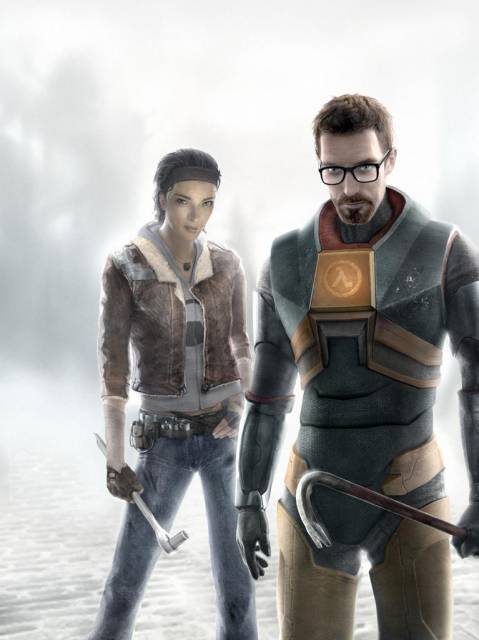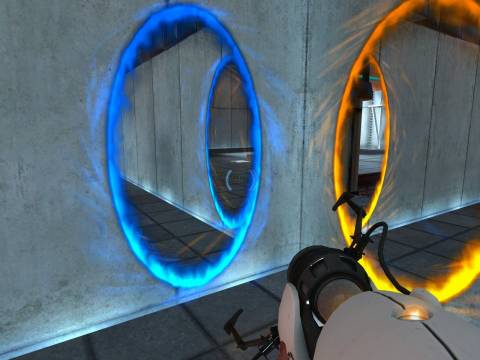Franchises
Overview
 Gordon & Alyx
Gordon & AlyxValve Software was founded in Bellevue, Washington in 1996. They quickly made their mark on PC gaming history with their debut title, Half-Life--a game which went on to receive numerous "Game of the Year" awards and is still widely regarded as one of the most influential FPS games ever made. Half-Life went on to spawn two official expansion packs (Opposing Force and Blue Shift, both developed by Gearbox, not Valve) and several multiplayer mods, including Counter-Strike, which for years after its release has consistently remained one of the most-played online shooters.
After the success of Half-Life, Valve stayed fairly quiet for a number of years, tending to the burgeoning mod communities to which Half-Life had given rise and doing R&D work on their next game engine. Finally, in 2004, Valve again shook the world of PC games with the critically acclaimed sequel to Half-Life, simply titled Half-Life 2. The game quickly became renowned for its atmospheric story-telling, polished gameplay, and robust physics system that could be easily and dramatically manipulated via the Gravity Gun. Released alongside Half-Life 2 was a full remake of their popular online shooter Counter-Strike, titled Counter-Strike: Source. Both Half-Life 2 and Counter-Strike: Source were Valve's first games to make use of their new, in-house-developed Source Engine.
 Portal - A picture is worth a thousand words.
Portal - A picture is worth a thousand words.Valve planned for episodic game releases to continue the Half-Life 2 storyline, and they released the first of these in 2006, titled Half-Life 2: Episode One. Following the release of Episode One, Valve began work on The Orange Box. The Orange Box became a five-game package for the PC, Xbox 360, and PS3, which included HL2, HL2: Episode One, HL2: Episode Two, Team Fortress 2, and Portal. Team Fortress 2, having been in fitful iterative development for nearly a decade, is the sequel to the popular multiplayer game Team Fortress: Classic, though it takes a much more stylized approach with visuals reminiscent of a Pixar film. Portal, inspired by a student project titled Narbacular Drop, is unusual among Valve's games and among first-person games in general in that it is not exactly a first-person shooter, but rather a first-person puzzler. The game saw the player navigating the Aperture Science Enrichment Center using a Portal Gun to teleport and maneuver through physics-based puzzles. The Orange Box was released in 2007, and garnered much critical acclaim for the variety, quality, and overall value of the games comprising it. Over the years since Team Fortress 2's release, Valve has set an industry-wide precedent for substantial and long-lasting post-release game support through their class updates and other TF2 DLC, all completely free to players.
 Main Characters for Left 4 Dead
Main Characters for Left 4 DeadFollowing in the wake of Counter-Strike: Source's and Team Fortress 2's success, Valve's next game was to be another online multiplayer shooter, but with a tighter cooperative emphasis, in Left 4 Dead, released at the end of 2008 for PC and Xbox 360. Inspired by the simple fun of fighting off hordes of knife-wielding bots in Counter-Strike, Left 4 Dead pits a lone band of four survivors against hordes of zombies in the aftermath of a full-blown zombie apocalypse. In a new speed record for Valve, they released a full sequel to Left 4 Dead just one year later to some fan backlash in Left 4 Dead 2. Left 4 Dead 2 added more content of almost every form to the Left 4 Dead formula, while also retaining much of the content from the first game.
In 2010, Valve released Alien Swarm, a Source-engine remake of the popular UT2004 mod developed by the original mod's developers who Valve hired several years earlier. Alien Swarm is available on Steam for free.
 Portals main characters- Chell and Glados
Portals main characters- Chell and GladosPortal 2 was announced on March 5, 2010 after a week-long alternate reality game which involved updates to the original game. Before the game was released, Valve released the Potato Sack, a second alternate reality game which involved 13 games and ultimately ended up in releasing the game several hours early on April 19, 2011. Portal 2 continues the story of Portal and adds a number of new game-play mechanics such as laser redirection, paint-like gels that can accelerate the players speed, place portals on any surface and jump higher.

On October 13, 2010 Dota 2 was officially announced on a Game Informer cover story after being hinted at in 2009. When Valve acquired the franchise, there was a trademark dispute between Valve and Blizzard with Blizzard claiming that the term Dota was an asset of their games community but it was later settled on May 11, 2012. The beta began in 2011 and officially released in July 2013 prior to Valve's tournament The International 3.
History
Beginnings
Valve was founded on August 24th 1996 by two former Microsoft employees: Gabe Newell and Mike Harrington. They were based in Kirkland, WA and were a Limited Liable Company (L.L.C). While still at Microsoft, Newell and Harrington had both played key roles in the development and success of Microsoft's Window's operating system.
 Gabe Newell
Gabe NewellAfter acquiring the rights to the Quake Engine from id Software, Valve began working on their first game: Half-life. Set to become a company tradition, the game suffered several delays and restarts, and its release was pushed back from 1997 to the end of 1998. When it finally released on November 19, 1998, it was published by Sierra Online. It received universal accolades for incorporating immersive environments and unique narrative all while still being a solid FPS. The game went on to be a massive commercial success, selling in excess of 9.8 million copies by 2008.
In 2003, Valve released Steam, a digital distribution platform for PC games. The service was originally widely criticized for server outages and technical issues, as well as the fact that it was required to play 2004's Half-Life 2, the long-awaited sequel to the original Half-Life. As Valve worked on fixing issues with the Steam client, as well as signing deals to bring third-party titles to the platform starting in 2005, public opinion gradually softened, and eventually became positive towards Steam. Since then, Steam has become the primary platform for digital distribution on PC.
Mod and Indie Support
Valve Corporation is well known for their support of user created content. Upon Half-Life's release, fans began making a number of mods for the game, expanding the single-player and multi-player potential of the game. Among these was Counter Strike, a free mod which quickly became popular among the community. Valve took interest in the mod, and hired the mod's developers on April 20, 2000, in order to make a full game out of the mod. This led to Half-Life: Counter-strike, a standalone release which soared in popularity and began the globally popular Counter-Strike franchise.
Valve had previously done this type of acquisition with the creators of Quake Fortress, a modification for the game Quake. Upon taking note of the mod, Valve contacted its creators and hired them, resulting in Team Fortress, a standalone port of Quake Fortress built on Half-Life's engine.
 Scene from Garry's Mod
Scene from Garry's ModWhen Valve released the Steam client in 2003, initial support for modders and independent developers was low. However, Valve would quickly take steps to increase support for modders on Steam, releasing the Source SDK alongside Half-Life 2. Using the SDK, modders had a large number of tools at their disposal to modify the Source Engine, leading many modders to transition from Half-Life's GoldSrc engine to the new Source Engine.
Valve also gave official support to one of the most well-known Source mods of all time, Garry's Mod. Created in 2004 by Garry Newman, Garry's Mod was a simple construction which allowed the user to pull assets from games made in Source Engine, and play with them as they see fit. Valve took interest in the mod, officially publishing it on Steam in 2006.
Support for independent games would become a larger focus on Steam starting in 2005, when Valve's interest in Rag Doll Kung Fu and Darwinia led them to bring the games to Steam as the platform's first non-Valve titles. Games like Audiosurf and World of Goo also found noteworthy success on Steam, leading to many indie developers at the time viewing a deal with Valve as the key to commercial success.
Important Dates
 A scene from Half-Life
A scene from Half-Life - August 24, 1996 - Valve Software is set up by Gabe Newell and Mike Harrington.
- November 19, 1998 - Half-life is released.
- January 15, 2000 - Mike Harrington dissolves his partnership with Valve, giving Gabe Newell full control.
- April 20, 2000 - Valve hires the developers of Counter Strike.
- 2003 - Valve moves to Bellevue, WA after becoming a corporation.
- September 12, 2003 - Valve releases Steam.
- November 16, 2004 - Half-life 2 is finally released, after numerous delays and complications, to glowing reviews.
- October 10, 2007 - The Orange Box is released, bundling Team Fortress 2, Portal and HL2: Episode 2.
- November 18, 2008 - Valve releases Left 4 Dead, followed by a sequel, Left 4 Dead 2, a year later.
- July 9, 2013 - Following legal disputes with Blizzard, Valve secures the rights to create Dota 2, a sequel to the Warcraft III: Reign of Chaos mod "Defense of the Ancients".
- 2013-2018 - Valve enters a period of relative quiet, releasing little information on in-development titles. This was in part due to a shift towards a hardware focus (resulting in the HTC Vive, the Steam Controller, and Steam Machines), as well as an extended period of project mismanagement known internally as "The Woods", resulting in very few developed projects reaching a release-ready state.
- April 21, 2018 - Valve acquires Firewatch developer Campo Santo.
- November 28, 2018 - Valve releases Artifact, a Dota-themed card game, to widely negative reception.
- June 28, 2019 - Valve releases the Valve Index, their first-party VR headset.
- March 20, 2020 - Valve releases Half-Life: Alyx, the first new Half-Life title in 13 years.
Key Figures
 Doug Lombardi
Doug LombardiDigital Comics
Throughout the years, Valve has created a number of comics based on their various franchises. Typically, these have been created to promote updates for games and new releases in existing series, however Team Fortress 2 has received a series of comics independent from the game itself, telling a story featuring characters from the Team Fortress franchise.
- Team Fortress 2: Update Comics - Various comics made over the years to promote Team Fortress 2 updates.
- Team Fortress 2: TF Comics - A series of comics introducing the Mann family, establishing the backstory for TF2.
- Left 4 Dead: The Sacrifice - A promotion for the then-upcoming Sacrifice update for Left 4 Dead.
- Portal: Lab Rat - A bridge between Portal 1 and 2, introducing the character of Doug Rattman.
- Dota 2: Are We Heroes Yet? - A promotion for Dota 2's pre-release beta launch.
A number of these have received print releases from Dark Horse Comics under the title Valve Presents: The Sacrifice and Other Steam-Powered Tales.
Log in to comment